人教版八年级上册Unit 1 Where did you go on vacation? Section A Grammar Focus -3c 课件(共23张PPT)
文档属性
| 名称 | 人教版八年级上册Unit 1 Where did you go on vacation? Section A Grammar Focus -3c 课件(共23张PPT) | 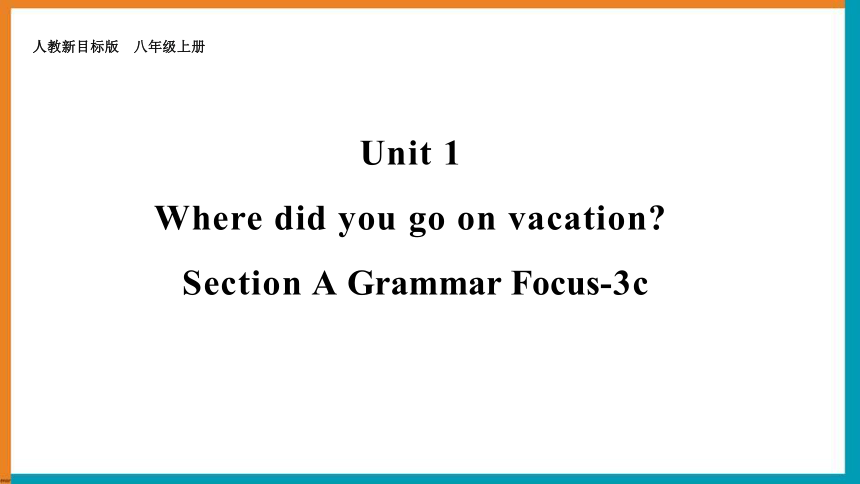 | |
| 格式 | zip | ||
| 文件大小 | 530.7KB | ||
| 资源类型 | 教案 | ||
| 版本资源 | 人教新目标(Go for it)版 | ||
| 科目 | 英语 | ||
| 更新时间 | 2022-10-03 08:34:14 | ||
图片预览

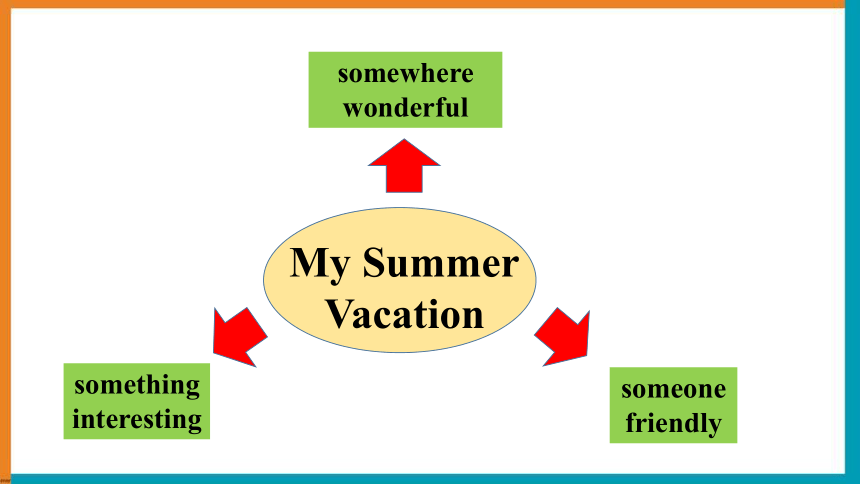
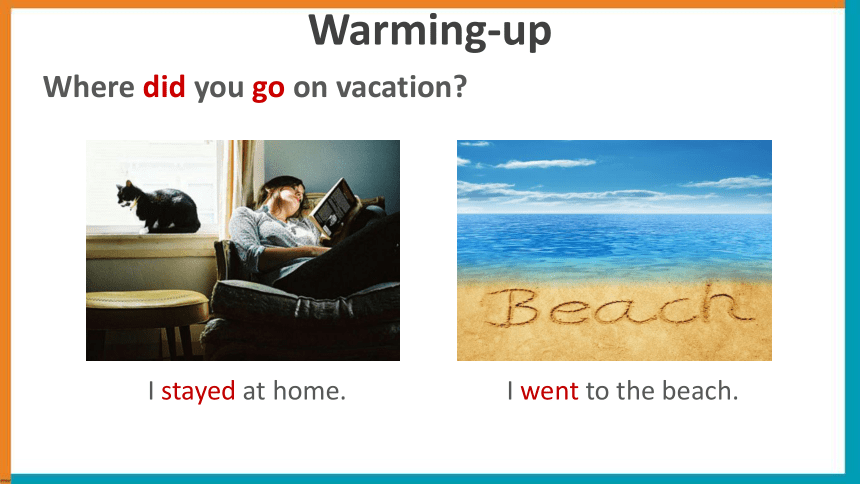

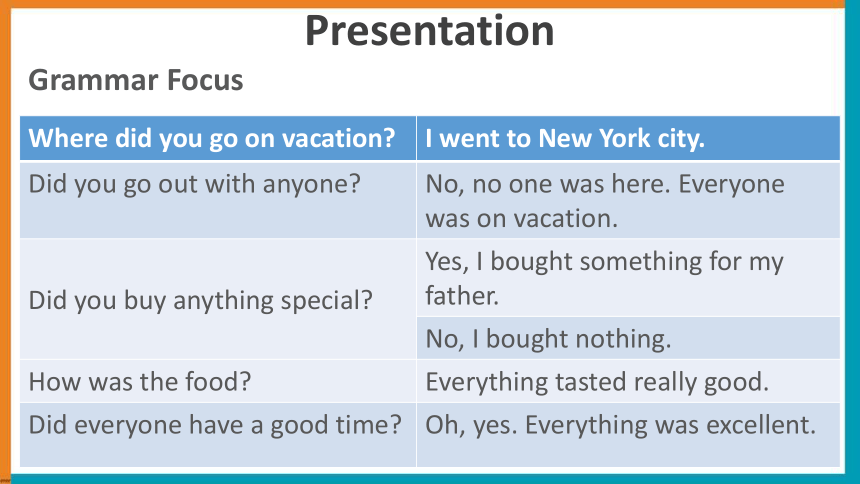
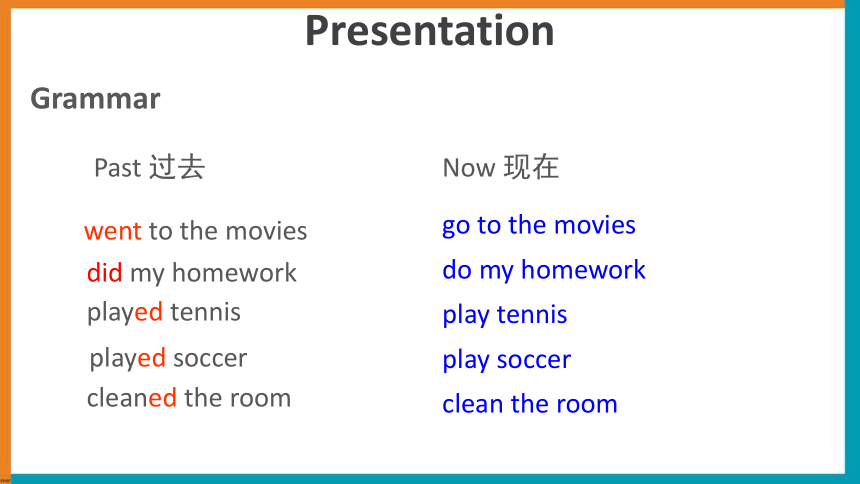
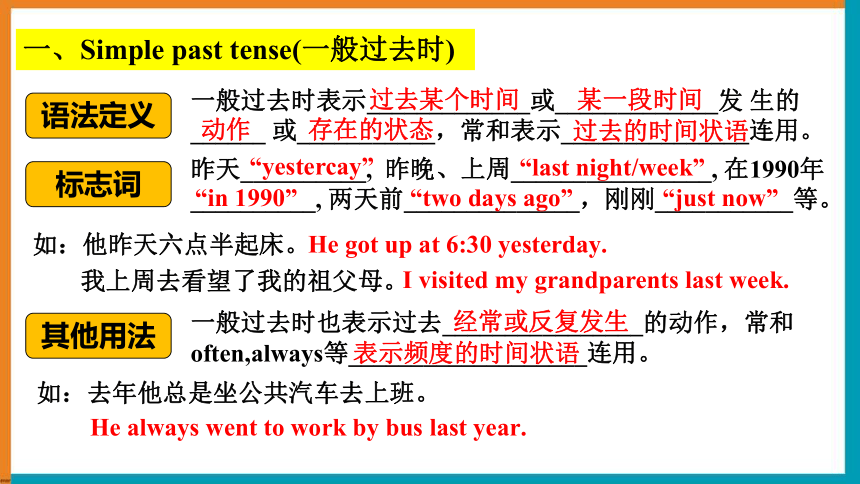
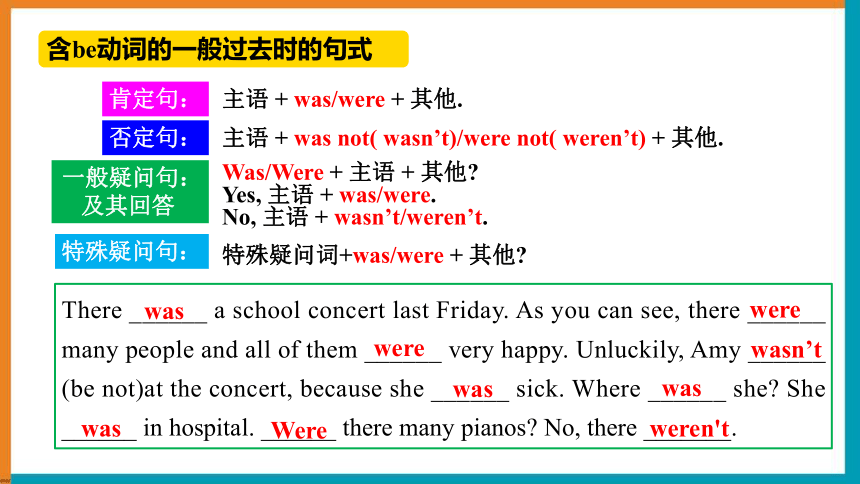
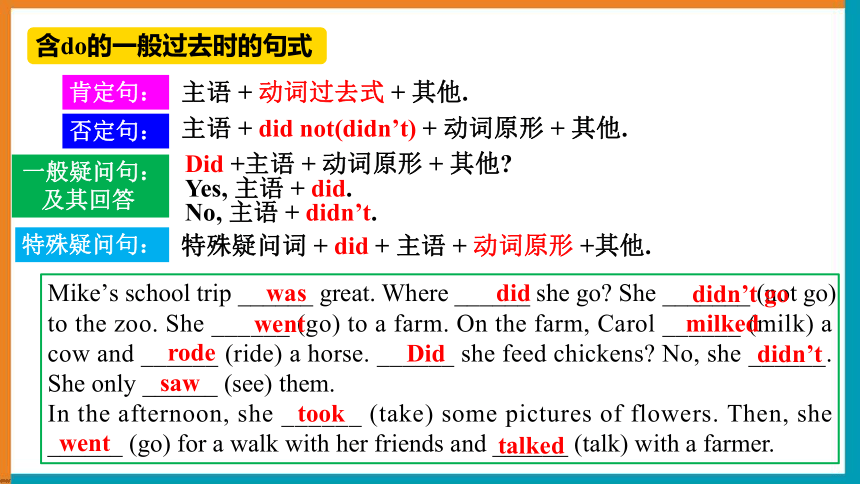
文档简介
(共23张PPT)
人教新目标版 八年级上册
Unit 1
Where did you go on vacation
Section A Grammar Focus-3c
My Summer Vacation
somewhere wonderful
something interesting
someone friendly
I went to the beach.
I stayed at home.
Where did you go on vacation
Warming-up
I went shopping.
Where did you go on vacation
I went to New York City.
Warming-up
Grammar Focus
Where did you go on vacation I went to New York city.
Did you go out with anyone No, no one was here. Everyone was on vacation.
Did you buy anything special Yes, I bought something for my father.
No, I bought nothing.
How was the food Everything tasted really good.
Did everyone have a good time Oh, yes. Everything was excellent.
Presentation
Past 过去
Now 现在
go to the movies
do my homework
play tennis
play soccer
clean the room
went to the movies
did my homework
played tennis
played soccer
cleaned the room
Presentation
Grammar
一、Simple past tense(一般过去时)
语法定义
一般过去时表示_____________或_____________发 生的______ 或___________,常和表示_______________连用。
过去某个时间
某一段时间
存在的状态
动作
过去的时间状语
标志词
昨天__________, 昨晚、上周________________, 在1990年__________, 两天前______________,刚刚___________等。
“yestercay”
“last night/week”
“in 1990”
“two days ago”
“just now”
如:他昨天六点半起床。
He got up at 6:30 yesterday.
I visited my grandparents last week.
我上周去看望了我的祖父母。
其他用法
一般过去时也表示过去________________的动作,常和often,always等___________________连用。
经常或反复发生
表示频度的时间状语
如:去年他总是坐公共汽车去上班。
He always went to work by bus last year.
含be动词的一般过去时的句式
肯定句:
否定句:
一般疑问句:
及其回答
特殊疑问句:
主语 + was/were + 其他.
主语 + was not( wasn’t)/were not( weren’t) + 其他.
Was/Were + 主语 + 其他
Yes, 主语 + was/were.
No, 主语 + wasn’t/weren’t.
特殊疑问词+was/were + 其他
There ______ a school concert last Friday. As you can see, there ______ many people and all of them ______ very happy. Unluckily, Amy ______ (be not)at the concert, because she ______ sick. Where ______ she She ______ in hospital. ______ there many pianos No, there _______.
was
were
were
wasn’t
was
was
was
Were
weren't
含do的一般过去时的句式
肯定句:
否定句:
一般疑问句:
及其回答
特殊疑问句:
主语 + 动词过去式 + 其他.
主语 + did not(didn’t) + 动词原形 + 其他.
Did +主语 + 动词原形 + 其他
Yes, 主语 + did.
No, 主语 + didn’t.
特殊疑问词 + did + 主语 + 动词原形 +其他.
Mike’s school trip ______ great. Where ______ she go She _______ (not go) to the zoo. She ______ (go) to a farm. On the farm, Carol ______ (milk) a cow and ______ (ride) a horse. ______ she feed chickens No, she ______. She only ______ (see) them.
In the afternoon, she ______ (take) some pictures of flowers. Then, she ______ (go) for a walk with her friends and ______ (talk) with a farmer.
was
did
didn’t go
went
milked
rode
didn’t
saw
took
went
talked
Did
Fill in the blanks with the words in the box and practice the conversation.
3a
Linda: Did you do ________ fun on your vacation, Alice
Alice: Yes, I did. I went to Sanya.
Linda: How did you like it
Alice: Well, it was my first time there, so
_________ was really interesting.
anyone
something
anything
everything
nothing
anything
everything
Practice
Linda: Did you go with ________
Alice: Yes, I did. I went with my sister.
Linda: Did you go shopping
Alice: Of course! I bought _________ for my parents,
but _______ for myself.
Linda: Why didn’t you buy ________ for yourself
Alice: I didn’t really see ________ I liked.
anyone
something
nothing
anything
anything
Practice
3b
Fill in the blanks in the e-mail message with the words in the box.
anything everything nothing everyone no one
Dear Bill,
How was your vacation Did you do _______ interesting Did ________ in the family go with you I went to a friend’s farm in the countryside with my family. ___________ was great. We fed some hens and saw some baby pigs. They were so cute! The only problem was that there was _______ much to do in the evening but read. Still _______ seemed to be bored. Bye for now!
Mark
anything
everyone
Everything
nothing
no one
Practice
3c
Ask your group questions about their last vacation. Then tell the class your results.
Did you … Everyone Someone (write the classmate’s name) No one
eat anything at a restaurant
read anything interesting
visit anyone in your family
buy anything
keep a diary
Production
A: Where did … go on vacation
B: I...
A: Did you....
B: Yes, ...
No, ...
In our group, everyone ate something at a
restaurant. XXX read something interesting....
Report
In our group, everyone ate something at a restaurant. No one read anything interesting. Li Lei visited his grandparents in the town. Liu Xue bought something interesting.
In our group, everyone ate something at a restaurant...
… read something interesting.
… visited his uncle in the town.
… bought something special.
… kept a diary.
… went to the museums.
Language points
1. How did you like it (教材P3 3a)
句型How ... sb. like ... =____________________=____________________ 同义,意为________________________。
What ... sb. think of ...
How ... sb. feel about…
“某人觉得……怎么样?”
如:你觉得这个电视节目怎么样?
How do you fell about the TV show
What do you think of the TV show
How do you like the TV show
你觉得这部电视剧怎么样?
—How do you like the TV play
—It’s wonderful.
反身代词的用法
第一人称 第二人称 第三人称
单数 myself yourself himself
herself
itself
复数 ourselves yourselves themselves
特例:不定代词one的反身代词是oneself
含有反身代词的一些固定短语
独自,单独
by oneself
玩得高兴;过得愉快
enjoy oneself
随便吃/用……
help oneself to…
自学
teach oneself
给自己穿衣服
dress oneself
伤着自己
hurt oneself
如:你为你自己买什么东西了吗
Did you buy anything _____________
那位老人自学英语。
The old man _____________ English.
上周我自己去拜访了姑姑。
I ________ visited my aunt last weekend.
这孩子能自己穿衣服了。
The child can _____________.
我一个人完成了这项工作。
I finished the work _____________.
for yourself
taught himself
myself
dress himself
by myself
Language points
2. There was nothing much to do in the evening but read. (教材P3 3b)
but作转折连词以外,but还可用作介词,意为____________。but前有实义动词do,does或did时,but后若接动词不定式应__________;but前无实义动词do,does或did时,but后若接动词不定式_______。
“除…之外”
省略to
应带to
如:我除了迟到。我别无选择。
I have no choice(选择) ____________ late.
你除了玩游戏还能做什么?
What can you do ______________
but to arrive
but play games
3. Still no one seemed to be bored. (教材P3 3b)
Language points
“seem ( + to be) +名词/形容词”意为__________________________,说明主语的特征或状态,to be_________,其中seem作连系动词,意为____________________。
“看起来……,好像……”
可省略
“好像;似乎;看起来”
如:这部电影似乎很有趣。
The movie _____________________.
seems (to be) interesting
她好象十分快乐。
He seems _________________.
(to be) quite happy
“主语+ seem + 不定式”,此句型中的seem与不定式一起构成复合谓语。
如:这个男孩似乎对它一无所知。
The boy _____________ nothing about it.
seems to know
“It seems + that从句”,其中it 是形式主语,that引导主语从句。
如:张先生好像在家。
____________ Mr. Zhang is at home.
It seems that
课堂练习
1. How many ________(hen) are there on the farm
2. James, help ________ (you) to some salad. It’s just behind you.
3. In my free time, I like to keep ________ (diary).
4. Why ________ (do not) you go on vacation last month
5. Is there ____________ (something) new in today’s newspaper
hens
yourself
diaries
didn’t
anything
Exercises
课堂练习
6. Does ________ live in this house
7. Would you like __________ to eat
8. It was a cold, rainy day and the children were ________.
9. It was really dark and I couldn’t see __________.
10. It ________ that Linda can’t come to the party.
something, anything, seem, bored, anyone
anyone
something
bored
anything
seems
Exercises
Homework
1. Do the exercises in students’ book.
2. Review the usage of indefinite pronouns.
3. Preview (Section B 1a-1e).
人教新目标版 八年级上册
Unit 1
Where did you go on vacation
Section A Grammar Focus-3c
My Summer Vacation
somewhere wonderful
something interesting
someone friendly
I went to the beach.
I stayed at home.
Where did you go on vacation
Warming-up
I went shopping.
Where did you go on vacation
I went to New York City.
Warming-up
Grammar Focus
Where did you go on vacation I went to New York city.
Did you go out with anyone No, no one was here. Everyone was on vacation.
Did you buy anything special Yes, I bought something for my father.
No, I bought nothing.
How was the food Everything tasted really good.
Did everyone have a good time Oh, yes. Everything was excellent.
Presentation
Past 过去
Now 现在
go to the movies
do my homework
play tennis
play soccer
clean the room
went to the movies
did my homework
played tennis
played soccer
cleaned the room
Presentation
Grammar
一、Simple past tense(一般过去时)
语法定义
一般过去时表示_____________或_____________发 生的______ 或___________,常和表示_______________连用。
过去某个时间
某一段时间
存在的状态
动作
过去的时间状语
标志词
昨天__________, 昨晚、上周________________, 在1990年__________, 两天前______________,刚刚___________等。
“yestercay”
“last night/week”
“in 1990”
“two days ago”
“just now”
如:他昨天六点半起床。
He got up at 6:30 yesterday.
I visited my grandparents last week.
我上周去看望了我的祖父母。
其他用法
一般过去时也表示过去________________的动作,常和often,always等___________________连用。
经常或反复发生
表示频度的时间状语
如:去年他总是坐公共汽车去上班。
He always went to work by bus last year.
含be动词的一般过去时的句式
肯定句:
否定句:
一般疑问句:
及其回答
特殊疑问句:
主语 + was/were + 其他.
主语 + was not( wasn’t)/were not( weren’t) + 其他.
Was/Were + 主语 + 其他
Yes, 主语 + was/were.
No, 主语 + wasn’t/weren’t.
特殊疑问词+was/were + 其他
There ______ a school concert last Friday. As you can see, there ______ many people and all of them ______ very happy. Unluckily, Amy ______ (be not)at the concert, because she ______ sick. Where ______ she She ______ in hospital. ______ there many pianos No, there _______.
was
were
were
wasn’t
was
was
was
Were
weren't
含do的一般过去时的句式
肯定句:
否定句:
一般疑问句:
及其回答
特殊疑问句:
主语 + 动词过去式 + 其他.
主语 + did not(didn’t) + 动词原形 + 其他.
Did +主语 + 动词原形 + 其他
Yes, 主语 + did.
No, 主语 + didn’t.
特殊疑问词 + did + 主语 + 动词原形 +其他.
Mike’s school trip ______ great. Where ______ she go She _______ (not go) to the zoo. She ______ (go) to a farm. On the farm, Carol ______ (milk) a cow and ______ (ride) a horse. ______ she feed chickens No, she ______. She only ______ (see) them.
In the afternoon, she ______ (take) some pictures of flowers. Then, she ______ (go) for a walk with her friends and ______ (talk) with a farmer.
was
did
didn’t go
went
milked
rode
didn’t
saw
took
went
talked
Did
Fill in the blanks with the words in the box and practice the conversation.
3a
Linda: Did you do ________ fun on your vacation, Alice
Alice: Yes, I did. I went to Sanya.
Linda: How did you like it
Alice: Well, it was my first time there, so
_________ was really interesting.
anyone
something
anything
everything
nothing
anything
everything
Practice
Linda: Did you go with ________
Alice: Yes, I did. I went with my sister.
Linda: Did you go shopping
Alice: Of course! I bought _________ for my parents,
but _______ for myself.
Linda: Why didn’t you buy ________ for yourself
Alice: I didn’t really see ________ I liked.
anyone
something
nothing
anything
anything
Practice
3b
Fill in the blanks in the e-mail message with the words in the box.
anything everything nothing everyone no one
Dear Bill,
How was your vacation Did you do _______ interesting Did ________ in the family go with you I went to a friend’s farm in the countryside with my family. ___________ was great. We fed some hens and saw some baby pigs. They were so cute! The only problem was that there was _______ much to do in the evening but read. Still _______ seemed to be bored. Bye for now!
Mark
anything
everyone
Everything
nothing
no one
Practice
3c
Ask your group questions about their last vacation. Then tell the class your results.
Did you … Everyone Someone (write the classmate’s name) No one
eat anything at a restaurant
read anything interesting
visit anyone in your family
buy anything
keep a diary
Production
A: Where did … go on vacation
B: I...
A: Did you....
B: Yes, ...
No, ...
In our group, everyone ate something at a
restaurant. XXX read something interesting....
Report
In our group, everyone ate something at a restaurant. No one read anything interesting. Li Lei visited his grandparents in the town. Liu Xue bought something interesting.
In our group, everyone ate something at a restaurant...
… read something interesting.
… visited his uncle in the town.
… bought something special.
… kept a diary.
… went to the museums.
Language points
1. How did you like it (教材P3 3a)
句型How ... sb. like ... =____________________=____________________ 同义,意为________________________。
What ... sb. think of ...
How ... sb. feel about…
“某人觉得……怎么样?”
如:你觉得这个电视节目怎么样?
How do you fell about the TV show
What do you think of the TV show
How do you like the TV show
你觉得这部电视剧怎么样?
—How do you like the TV play
—It’s wonderful.
反身代词的用法
第一人称 第二人称 第三人称
单数 myself yourself himself
herself
itself
复数 ourselves yourselves themselves
特例:不定代词one的反身代词是oneself
含有反身代词的一些固定短语
独自,单独
by oneself
玩得高兴;过得愉快
enjoy oneself
随便吃/用……
help oneself to…
自学
teach oneself
给自己穿衣服
dress oneself
伤着自己
hurt oneself
如:你为你自己买什么东西了吗
Did you buy anything _____________
那位老人自学英语。
The old man _____________ English.
上周我自己去拜访了姑姑。
I ________ visited my aunt last weekend.
这孩子能自己穿衣服了。
The child can _____________.
我一个人完成了这项工作。
I finished the work _____________.
for yourself
taught himself
myself
dress himself
by myself
Language points
2. There was nothing much to do in the evening but read. (教材P3 3b)
but作转折连词以外,but还可用作介词,意为____________。but前有实义动词do,does或did时,but后若接动词不定式应__________;but前无实义动词do,does或did时,but后若接动词不定式_______。
“除…之外”
省略to
应带to
如:我除了迟到。我别无选择。
I have no choice(选择) ____________ late.
你除了玩游戏还能做什么?
What can you do ______________
but to arrive
but play games
3. Still no one seemed to be bored. (教材P3 3b)
Language points
“seem ( + to be) +名词/形容词”意为__________________________,说明主语的特征或状态,to be_________,其中seem作连系动词,意为____________________。
“看起来……,好像……”
可省略
“好像;似乎;看起来”
如:这部电影似乎很有趣。
The movie _____________________.
seems (to be) interesting
她好象十分快乐。
He seems _________________.
(to be) quite happy
“主语+ seem + 不定式”,此句型中的seem与不定式一起构成复合谓语。
如:这个男孩似乎对它一无所知。
The boy _____________ nothing about it.
seems to know
“It seems + that从句”,其中it 是形式主语,that引导主语从句。
如:张先生好像在家。
____________ Mr. Zhang is at home.
It seems that
课堂练习
1. How many ________(hen) are there on the farm
2. James, help ________ (you) to some salad. It’s just behind you.
3. In my free time, I like to keep ________ (diary).
4. Why ________ (do not) you go on vacation last month
5. Is there ____________ (something) new in today’s newspaper
hens
yourself
diaries
didn’t
anything
Exercises
课堂练习
6. Does ________ live in this house
7. Would you like __________ to eat
8. It was a cold, rainy day and the children were ________.
9. It was really dark and I couldn’t see __________.
10. It ________ that Linda can’t come to the party.
something, anything, seem, bored, anyone
anyone
something
bored
anything
seems
Exercises
Homework
1. Do the exercises in students’ book.
2. Review the usage of indefinite pronouns.
3. Preview (Section B 1a-1e).
同课章节目录
- Unit 1 Where did you go on vacation?
- Section A
- Section B
- Unit 2 How often do you exercise?
- Section A
- Section B
- Unit 3 I'm more outgoing than my sister.
- Section A
- Section B
- Unit 4 What's the best movie theater?
- Section A
- Section B
- Unit 5 Do you want to watch a game show?
- Section A
- Section B
- Unit 6 I'm going to study computer science.
- Section A
- Section B
- Unit 7 Will people have robots?
- Section A
- Section B
- Unit 8 How do you make a banana milk shake?
- Section A
- Section B
- Unit 9 Can you come to my party?
- Section A
- Section B
- Unit 10 If you go to the party, you'll have a grea
- Section A
- Section B
